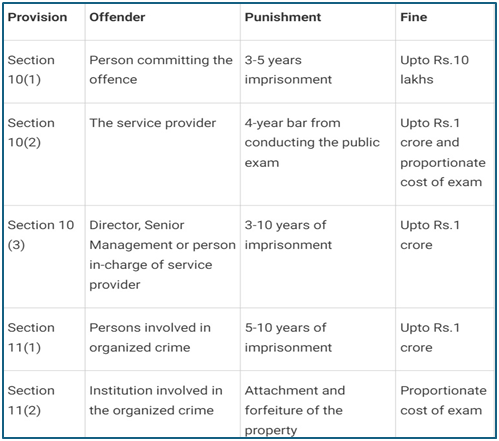Why in news?
With the recent controversies surrounding the National Eligibility-cum-Entrance Test (NEET) UG-2024 and the cancellation of the University Grants Commission-National Eligibility Test (UGC-NET), public examinations have come under increased scrutiny.
UGC-NET 2024 was cancelled on June 19 after the Union Home Ministry found that the integrity of the examination may have been compromised. UGC-NET is the qualifying exam for admission to PhD programs, and to apply for an entry-level teaching position at an Indian university.
This was the first time a centrally-conducted public examination has been scrapped after Parliament passed Public Examinations (Prevention Of Unfair Means) Act in February 2024.
What’s in today’s article?
- Public Examinations (Prevention Of Unfair Means) Act 2024
- Challenges and way forward
Public Examinations (Prevention Of Unfair Means) Act 2024
- About
- This act was passed by the Indian Parliament in February 2024. It aims to prevent unfair means in order to bring greater transparency, fairness and credibility to the public examinations system.
- Wide scope of application
- The Act is the first Central Government legislation addressing unfair practices in public examinations.
- It has a broad scope, allowing for the inclusion of other agencies through government notifications.
- Considerate of candidates’ welfare
- Bona fide candidates of the public examinations are kept outside the purview of the Act.
- Even the defaulting candidates will not be punished within the Act however, appropriate action will rather be taken by the concerned public examination authority.
- Unfair means in an examination has been defined
- Section 3 of the Act lists at least 15 actions that amount to using unfair means in public examinations for monetary or wrongful gain.
- These include:
- Leakage of question papers or answer keys and colluding in such leaks.
- Unauthorized access to question papers or Optical Mark Recognition (OMR) response sheets.
- Tampering with answer sheets, including OMR sheets.
- Unauthorized persons providing solutions during exams.
- Assisting candidates indirectly or directly.
- Tampering with documents used for shortlisting or ranking candidates.
- Tampering with computer systems or networks.
- Creating fake websites.
- Conducting fake exams and issuing fake admit cards or offer letters for cheating or monetary gain.
- Inclusive and comprehensive
- The Act comprises 19 sections across six chapters, addressing all aspects of preventing unfair means in public examinations.
- It includes comprehensive definitions covering various unfair practices such as question paper leaks, assistance to candidates, security violations, and tampering with computer systems.
- It also addresses details like manipulation in seating arrangements.
- Punishments

- Section 9 of the Act states that all offences shall be cognizable, non-bailable, and non-compoundable.
- This means that an arrest can be made without a warrant and bail will not be a matter of right; rather, a magistrate will determine whether the accused is fit to be released on bail.
- Public examination defined
- Section 2(k) defines a public examination as any examination conducted by a public examination authority listed in the Act's Schedule or any other authority designated by the Central Government through notification.
- The central government can add new authorities in the schedule through a notification as and when required.
- Power to Refer Investigation to a Central Agency
- The Act empowers the Central Government to refer any case under the Act to a Central Investigating Agency whenever necessary in order to ensure expeditious and cautious disposal of matters concerned.
- Designation of a Public Servant
- The Act designates the officials of public examination authority as public servants, thereby ensuring accountability and transparency in the process.
- As a result, appropriate administrative action can be taken against the defaulting public servants, following the service rules and procedures of the authority.
- Status of organized crime
- Section 11 of the Act addresses organized crimes, imposing punishments ranging from 5 to 10 years and fines up to 1 crore rupees.
Criticism and way forward
- Fate of public examinations cancelled due to unfair means
- The Act does not specify a time frame for rescheduling exams canceled due to unfair means.
- Given the high stakes for numerous candidates, timely rescheduling is crucial.
- It is recommended that canceled exams be re-conducted within six months to preserve candidates' merit and preparation, ensuring fair opportunities for all.
- Invigilators and Officials are unaware of examination procedures
- Invigilators and administrative officers often lack proper training, leading to inefficiencies and opportunities for unfair practices.
- To prevent this, eligibility criteria for invigilators should be established. Intensive training programs and workshops should be conducted to equip invigilators with necessary skills.
- Investigation referred to a DSP level officer
- The Act designates officers of at least Deputy Superintendent of Police (DSP) or Assistant Commissioner of Police rank to investigate unfair means in public examinations.
- However, given the significant impact on candidates, a specialized investigation and regulation authority should be established for systematic investigation of these offences.
- Underutilization of Modern Technology and AI
- Authorities have yet to effectively use technology to counteract offenders who are increasingly using it for their schemes.
- Electronic methods can streamline the question paper-setting process, reduce time, and allow for digital verification of question sets.
- Centralized question banks can make managing and updating questions more efficient.
- Electronic printing and distribution of exam papers can also minimize the risk of paper leaks.
- Integrating technology like Artificial Intelligence (AI) can enhance the evaluation stage by catching discrepancies overlooked by humans.










